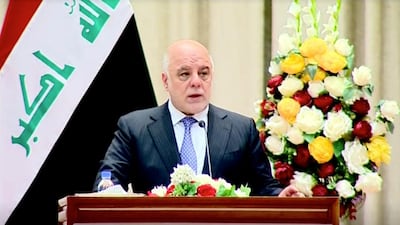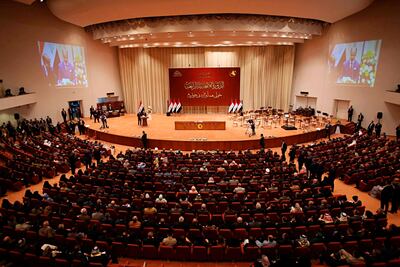Prime Minister Haider Al Abadi on Monday put himself in charge of government security forces including militias led by a political rival as the first session of Iraq's new parliament got off to a stormy start.
Mr Al Abadi walked out of the proceedings after addressing parliament and announced soon afterwards that he was assuming the post of National Security Adviser and head of the Hashed Al Shaabi, the largely Shiite paramilitary forces mobilised to fight ISIS.
The move increases the political turmoil surrounding the formation of Iraq's next government, which has already been delayed by challenges to the results of the May 12 election over alleged fraud.
A coalition between Mr Al Abadi and the populist cleric Moqtada Al Sadr is vying for majority support in parliament against one formed by Hadi Al Ameri, commander of the Iran-backed Hashed Al Shaabi forces, and former prime minister Nouri Al Maliki. Both groups claim to have put together support from the majority of MPs.
Mr Al Sadr, whose political bloc won the most seats, portrays himself as a nationalist who rejects both American and Iranian influence, while Mr Al Abadi is seen as the preferred candidate of the United States. Mr Al Ameri and Mr Al Maliki are Iran's two most prominent allies in Iraq.
Parliament is expected to reconvene on Tuesday after members of the major political blocs stormed out of the opening session without achieving their first task of electing a new speaker.
________________
Read more:
Iraqi rival groups both announce parliamentary blocs to form government
US calls for 'moderate, nationalist' government ahead of Iraqi parliament opening
Iran accused of coercing Iraqi politicians into Shiite alliance
________________
In his opening address to parliament, Mr Al Abadi, who took over from Mr Al Maliki after ISIS seized large areas of Iraq in 2014 and oversaw the war against the insurgents by US-backed security forces and the Hashed Al Shaabi, said the next government should focus on reconstruction, services and providing jobs.
"It is the time for economic reforms and expanding our security achievements," said Mr Al Abadi, who declared victory over the extremists in December.
Iraqi President Fuad Masum began the session by outlining the need to rebuild the country, with a focus on security and lifting people out of poverty.
“Iraq has regained its regional and international place or role. We are seeking to form a government that will serve public demands,” Mr Masum said.
Mr Masum also warned of the dangers of oil dependency, telling the new MPs they were responsible for bringing change to the country.
The next government faces the tasks of rebuilding the north of the country that was ravaged by the war against ISIS and rehabilitating services in the south, where severe water and electricity shortages have triggered protests.
The government formation process begins with MPs electing the parliament speaker, a post that traditionally goes to a member of Iraq's Sunni minority, and two deputies. After that, they will have 30 days to elect a new president, a largely symbolic position that traditionally goes to a member of the Kurdish minority. The new president will then have 15 days to ask the largest parliamentary bloc to form a new government.
The new parliament was convened two weeks after election results were ratified on August 19. The recount saw little change, with Mr Al Sadr's alliance retaining its 54 seats. Mr Al Ameri's bloc, made up members of Shiite paramilitary groups, remained in second place with 48 seats, followed by Mr Al Abadi's bloc with 42. Mr Al Maliki's bloc came in fifth with 25 seats.



